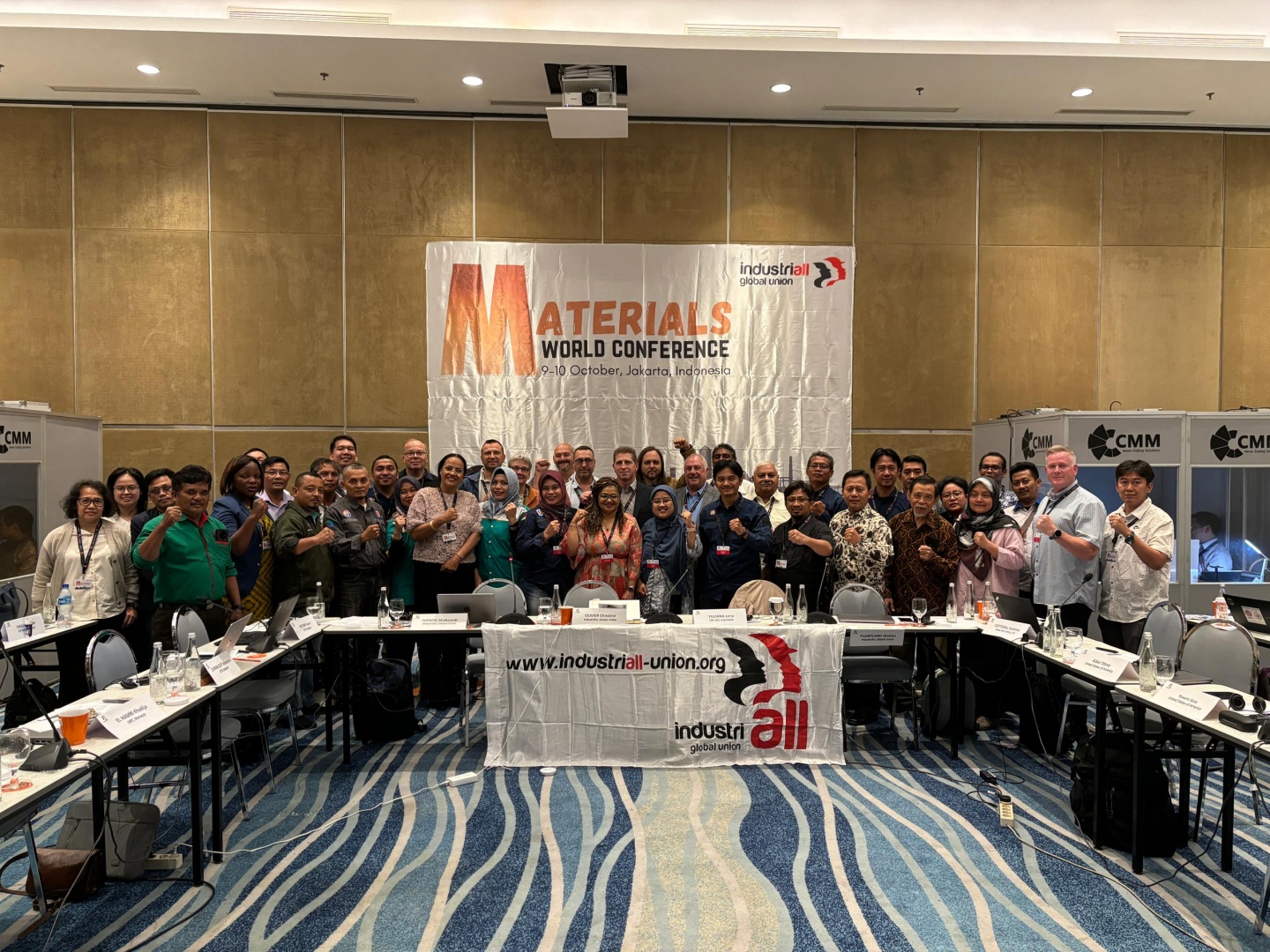17 October, 2024Over 50 trade unionists from around the world gathered on 9-10 October, in Jakarta, for the IndustriALL Global Union world conference for materials industries.
The conference brought together representatives from key sectors including cement, glass, ceramics, and adjacent industries addressing the critical challenges faced by workers amidst industry transformations due to automation, environmental policies, and economic pressures.
The conference condemned widespread use of precarious workers in India, where 80 to 90 percent of workers are hired as subcontract or agency workers, and urged the Indonesian president-elect Prabowo Subianto to abolish the Omnibus Law that empowers employers to hire subcontract workers with no limitation.
Christina Olivier, IndustriALL assistant general secretary, highlighted:
“Materials’ industries are confronted with significant challenges, from environmental concerns and economic pressures to technological advancements and regulatory issues. The cement industry's 7-8 percent share of global CO2 emissions and the glass and ceramics industries' 1-2 percent share each underscore the urgent need for transformative change and decarbonization. And the transformation and change must be just and equitable to address the impacts on workers.”
The statement released by the delegates highlights growing concerns over labour rights violations, precarious working conditions, and the need for a just transition that includes protections for all workers. As materials industries pivot toward greener technologies, trade unions are calling for the creation of sector-specific just transition plans that include also vulnerable workers such as subcontracted and casually employed labourers.
The delegates discussed results of the recently concluded tripartite meeting organized by the International Labour Organization (ILO) held from 23-27 September in Geneva where representatives of workers, governments, and employers, led by IndustriALL Global Union and Building and Wood Workers International (BWI), agreed on new steps to transform the building materials industry, focusing on forging a sustainable path that balances economic growth, environmental sustainability, and social justice.
In her opening remarks , Lena Yuliana, chair of the women's committee of the Federation of All Indonesian Workers' Unions - FSP ISSI and co-chair of IndustriALL materials sector, said:
“We must address the increasing use of subcontracting, not only within the supply chain but also in core processes and tackle occupational health and safety challenges. Another crucial challenge is gender mainstreaming, as women’s representation in this sector remains below 10 percent.”
Union leaders from many countries voiced their concerns over worsening working conditions. In India, wage disparities between blue-collar and white-collar workers were reported, with precariously employed workers often earning as little as 30-50 US dollars per month.
The shift toward casual employment systems in many plants has reduced the number of permanent positions, leaving workers without basic benefits like medical insurance and social security. In some countries of the global south, the cement sector was highlighted as being particularly affected, with up to 90 percent of its workforce operating in precarious conditions, often through subcontracting, labour brokers and agency agreements.
“Employers are fragmenting the workforce to maximize profit, but it’s preventing workers from developing skills or securing stable employment in future,”
said Alexander Ivanou, director of IndustriALL materials industries sector.
The delegates also called for stronger government regulations to ensure multinational companies respect human and labour rights, particularly via public procurement and occupational safety standards.
The conference underscored the need for inclusive policies that support gender equality and sustainable employment for young workers. Delegates called for a minimum of 40 percent women’s participation in union delegations and demanded better working conditions, including flexible hours, parental leave, and career development opportunities for women.
Looking forward, the union leaders committed to intensifying their efforts to support workers across borders and committed to campaign for safer working environments, fair wages, and protection of workers' rights throughout the entire supply chain.
“Together, we will build workers' power and ensure that no one is left behind in the transition toward a sustainable and fair future”, the statement concluded.
Adopted unanimously, this declaration reinforces the collective resolve of workers in the materials industries to secure a just transition that prioritizes decent work, safety, and fair treatment for all.
Based on debates and discussions, the delegates also agreed on Action plan listing their future actions and activities before the next Congress of IndustriALL at the end of 2025.
